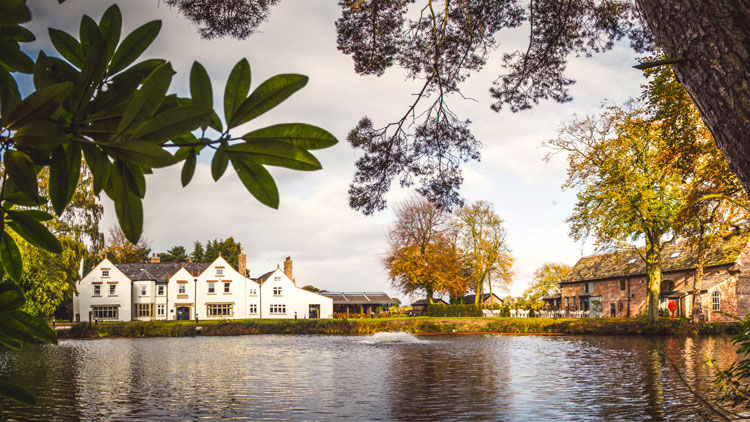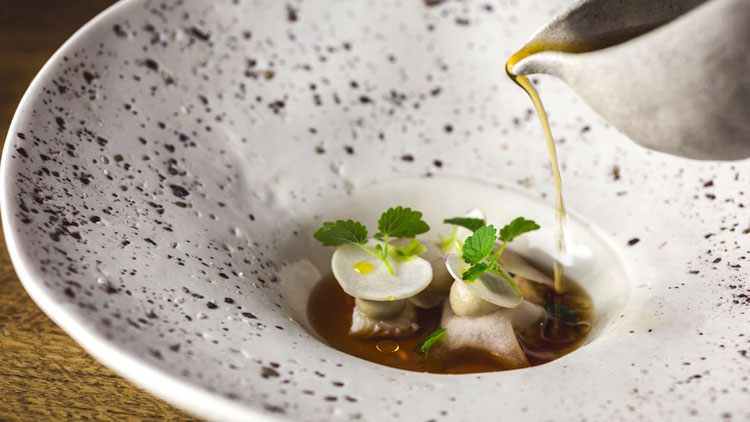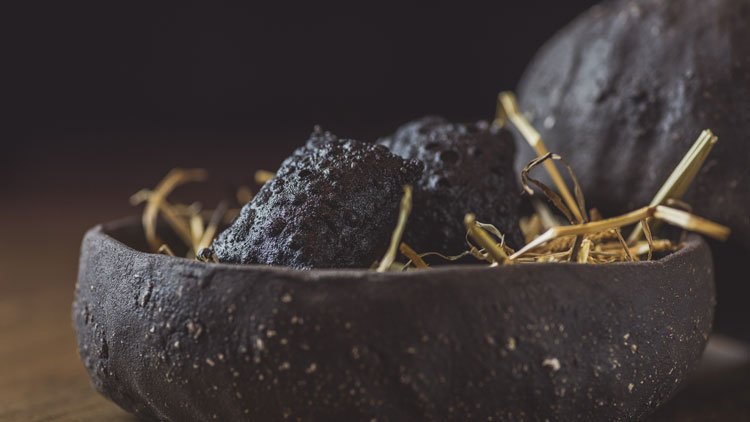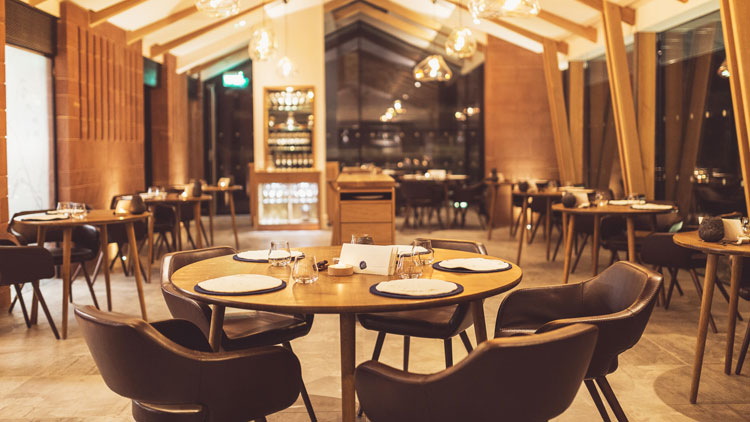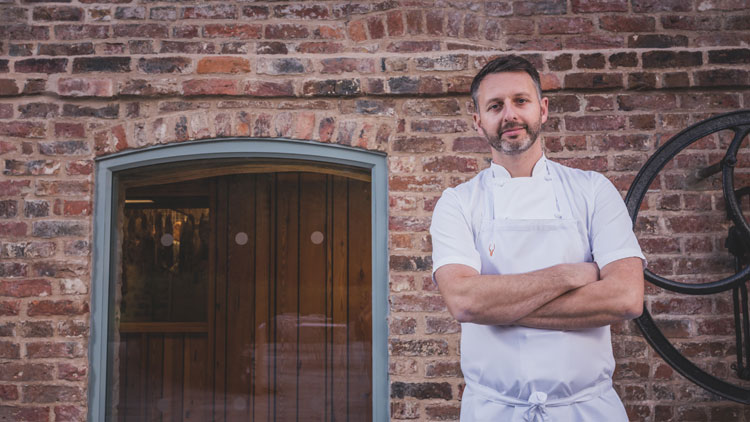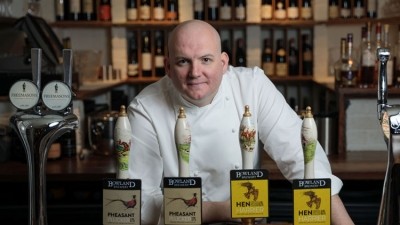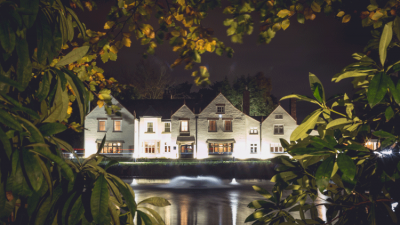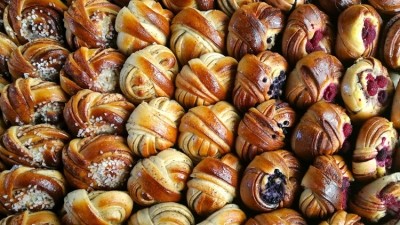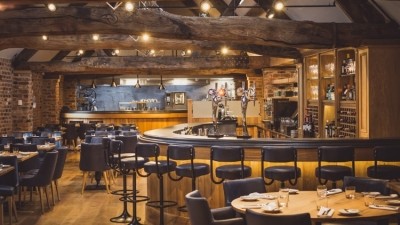Under the Knife: Mark Birchall on Moor Hall
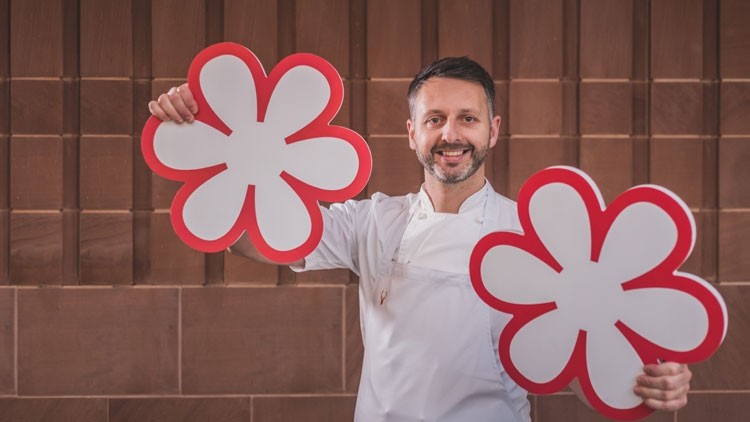
On 1 October Mark Birchall’s Lancashire restaurant Moor Hall was awarded its second Michelin star, despite having been open less than two years. Given that there are only 17 other restaurants in England to have obtained that accolade (10 of which are in the capital) it’s an incredible achievement, so when Birchall stood on stage at the Michelin event to acknowledge the rating he didn’t seem altogether surprised. Had he been tipped off? “I swear on my son’s life I did not know,” is his emphatic response.
Birchall is no stranger to a two Michelin-starred kitchen, having been right-hand man to Simon Rogan at L’Enclume for just shy of a decade. But being part of someone else’s double-starred restaurant is one thing, running your own is entirely different. Indeed, few would have predicted with any certainty that Moor Hall would gain a second star in Michelin’s latest guide (this is more a reflection on how the red book tends to award stars than on the restaurant) so what made Birchall believe he was in with a chance?
“It’s really tricky to answer that without sounding arrogant,” he says. “You don’t expect something like this, especially so quickly, but I know what we do, and I thought we were good enough. We’ll have been open two years in March but I’ve been cooking for more than 20 years – so it doesn’t feel quick. We deserve to be where we are, our guests tell us that.”
Coming from the mouths of certain chefs this could sound like hubris, but with Birchall such confidence is more down to work ethic than ego. The softly spoken Lancashire-born chef is 100% swagger free, often to the point of introversion, and is not one to shout about his achievements. Instead he chooses to quietly go about his business, an approach that often sees him miss out on publicity opportunities.
“I’ve been so focused on what we do, I keep the distractions to a minimum,” he adds. “I get asked all the time to do chef collaborations and I say no. I don’t want to be in someone else’s kitchen cooking for their customers – all I do is focus on my own restaurants. Maybe it’s a bit selfish, but you need to be.”
The road to Moor Hall
Birchall speaks as a chef for whom awards and favourable guide-book listings are an essential part of his being. A Roux Scholarship winner, he was inculcated into the world of fine dining from early on in his career, and the feeling that he has a point to prove is palpable.
For him, getting a star and then a second isn’t about bragging rights but about recognition; recognition for the hours he puts in (“I don’t miss a service. I know everyone says that, but we have an open kitchen, if you walk in you’ll see me here”); recognition that he can achieve what his mentors have – and one day maybe even surpass them, although he insists this isn’t what drives him.
“There is no end game, there shouldn’t be one, you’ve got to keep progressing and developing yourself and the people around you. I had no goals set in terms of winning one star in the first year, two stars in the second, three stars in five years, there is no ultimate plan.
“But we have ambitions. Can we win three stars? Yes, we can. The foundations are there. You’ve got to be pushing an open door – what would be the point of any guide if it’s not achievable? You have to set goals, whether they are realistic goals, ambitious goals or outrageous goals. We do have outrageous goals (he wants a perfect score in all guides). You can’t not.”
Moor Hall itself is an ambitious undertaking. Located in a grade II-listed building dating back to the thirteenth century set in five acres of gardens and with its own lake, it is more than just a two-star restaurant with rooms (it has seven bedrooms). As well as the main glassfronted flagship restaurant complete with its own cheese room and with a one-acre kitchen garden to the rear, the estate is home to The Barn, a large, more casual restaurant (which holds a Bib Gourmand). Then there’s a small development kitchen, a charcuterie room, a butchery and space for a dairy, bakery and brewery, which are in the pipeline.
Bought in 2015 by Andy and Tracey Bell with Birchall as a partner following nine months of searching for a suitable site, the project itself required a lot of vision. Birchall hadn’t intended on something so grand, and had looked at all kinds of restaurants in numerous locations, including old Indian restaurants, disused pubs and high-street sites, before eventually being beguiled by the more rural setting he now finds himself in.
“The first time I looked at it I hated it. I thought it was too dark and old. It needed too much work. But on the second visit I visualised where the restaurant could go, and what to do with the gardens and the barn.”
Renovations were lengthy (planning permission took six months to be granted) and costly, with ‘multi-million pound’ expenditure behind the scenes, including the building of an electricity sub station, the demolition and rebuilding of roofs and the landscaping of the estate. All in all it took two years from purchase to opening, but the results speak for themselves.
During this time, Birchall found himself out of work, having left L’Enclume in the summer of 2015 (he had intended to open his own place just a year later). Although he was involved with the design of the restaurants and kitchen space, he found himself with a lot of time on his hands. So what did he choose to do with it? Cook, of course. And eat.
Birchall became a gun for hire, doing stages at restaurants including Azurmendi in Spain, De Librije in The Netherlands and, closer to home, The Ledbury in Notting Hill. “I wanted to see some different surroundings, styles of service, restaurants with a different ethos and culture.”
Did it feel strange doing stages as a former executive chef of a two-star restaurant, mixing it with younger people? “I won the Roux Scholarship as head chef at L’Enclume and did a stage at El Cellar De Can Roca with lots of 18-year-old Spanish kids. It was difficult but you’re all there for the same reason, to learn new things. You never stop learning. I would love to do some more stages in Europe.”
When not cooking, he found himself on the other side of the pass in the dining rooms of some of the world’s best restaurants. Two meals in particular left a lasting impression, both in New York: Thomas Keller’s Per Se and at Brooklyn Fare, where he says owner César Ramírez’s policy of discouraging food photography created a sense of anticipation he wanted to replicate at his own restaurant. “Eating out helps to see where you are. It helps you discover whether you’re doing a good job.”
A room of one's own
Back to Moor Hall and to when Birchall finally threw open the doors to his flagship restaurant in 2017. Was he concerned that people would try and draw comparisons with his time working with Rogan?
A year previously, another L’Enclume alumnus, Kevin Tickle, formerly chief forager at the restaurant and head chef at nearby Rogan & Co, left to open his own restaurant The Forest Side at Grasmere and there was a feeling in some quarters of the industry that, through Tickle and Birchall, Rogan’s DNA was being cloned across the country’s dining rooms.
Birchall acknowledges that comparisons were going to be made, but says he has put his own stamp onto his cooking at Moor Hall. He also admits that him and Rogan are no longer in touch, although he won’t be drawn further on his relationship with his former boss.
“What I do is original. I’m not saying it’s wacky and we do have some classically-based dishes but you can see some that are very Moor Hall. I never wanted comparisons to L’Enclume, and at the same time L’Enclume moved on. There is no competition there whatsoever.”
Even so, did he feel pressure at the start to cook differently to L’Enclume to avoid any comparisons? “There’s always conflicting stories of where dishes and ideas come from,” he says, coyly. “Fundamentally, L’Enclume is Simon’s restaurant and Moor Hall is mine.”
The restaurant is open for lunch Thursday to Sunday and for dinner Wednesday to Sunday. An evening meal at Moor Hall starts in the adjoining bar where drinks are served along with a selection of home-made charcuterie. Diners are then led into the smart dining room, with views over the open kitchen on one side and the lake on the other, where either a five or eight-course menu (£70 and £105 respectively) is served – although Birchall is upping the ante from January next year serving only an eight-course evening meal, priced at £125.
A procession of snacks include a small pillow of black pudding with pickled apple, which has been on the menu from day one; a delicate potato basket with smoked eel and fermented garlic flowers; and a poached oyster with cured ham, dill and buttermilk.
Dishes such as baked carrots with Doddington cheese ‘snow’; and turnip and crab with anise hyssop and sunflower seeds, have also been on the menu in one form or other from the start, with others on the current menu including turbot with artichoke, mussel cream and sea vegetable; and roast Goosnargh duck with elderberry, beetroot and kale.
The service style is smart but informal, with chefs emerging from the kitchen to finish dishes at the table on occasion, but not frequently enough to make it gimmicky. Bread comes with a deep-yellow cultured butter and also a vibrant green herb option and halfway through the meal, just when you’re mourning the end of the bread, out comes a surprise warm onion roll, more like a pastry than bread.
The cheese room also comes into play as part of the meal, with diners invited in for a change of pace (and temperature) to chose from the British-only selection. In the future, Birchall hints this approach could be extended so guests visit the charcuetrie room or dairy (once open) to add to the experience.
This slightly unconventional style of service extends to breakfast, with overnight guests sitting down to a table laid with various breads, pastries and compotes as well as yoghurt and muesli followed by a selection of courses, including charcuterie, smoked salmon, a soft boiled egg, and a plate piled with crispy bacon, sausages and black pudding.
A work in progress
These touches have contributed to Moor Hall’s status as a serious gastronomic destination, but it is still very much a work in progress. Birchall expects the dairy to go live by the end of the year so that it can start making its own cheese and butter but the bakery and brewery are much longer term projects, possibly up to 18 months away still. This is typical of Birchall’s laconic, unhurried persona; he certainly isn’t a man to be rushed.
“If I’d opened the butchery, the dairy, the bakery and the brewery at the same time I would have had a breakdown. We started with this [the main restaurant], then opened The Barn in October and then did the charcuterie. The bakery needs one person baking there five days a week at least, which is a big commitment. We’re trying to focus on one thing at a time.”
Five years down the line, the estate could even have a little concession where people can buy some products to take home, whether it be vegetables from garden, charcuterie, bread or meat. He’s also just inoculated some hazel trees in the grounds with truffe spores with the aim of growing his own truffles in a few years. It’s all about the long game. “Everything we’re doing is to enhance our product,” he says.
When everything is eventually up and running, Moor Hall will be even more of a gastronomic destination with intent – one likely to further impress Michelin’s inspectors. Yet more pressing is perfecting the casual dining offer at The Barn, which hasn’t been without its challenges. Open Wednesday to Sunday, the spacious first floor restaurant offers a lunch menu (two courses for £19, three for £23) alongside an a la carte menu of starters (£6-£9) such as broccoli soup with Stichelton; and seared mackerel with beetroot and horseradish; and mains of (£15-£24) of Herdwick lamb rump and breast with Jerusalem artichoke; and roasted hake with hen of the woods.
“The food is the same quality and we use the same suppliers, but it’s a difficult message to get across in casual dining that it’s not lesser quality but more simple, maybe less refined. We’re using Goosnargh duck that we serve [at the two-star restaurant] at The Barn. There are not many high-end and casual restaurants in the same location – a lot of hotels have fine dining and a brasserie, but I hate both of those terms.”
Despite its rural location, he wants The Barn to appeal to the masses. “We want it to be a good neighbourhood restaurant. The area is very suburban even though it’s surrounded by farmland – it’s only 25 minutes out of Liverpool city centre and 45 from Manchester airport.”
Does he think The Barn can eventually be upgraded from a Bib Gourmand to a star? “Probably, at some point,” is the somewhat predictable answer. “It’s the same ethos. We’ve just got to keep moving forwards and constantly improving. If you do that, things come.”
The pressure of stardom
Thus the conversation inevitably returns to Michelin. Behind his phlegmatic, cool exterior, is there a new found pressure with having to now retain two stars? Not for Birchall, who says that bookings have increased by a very welcome 35% to 40% since 1 October.
“I’m not in fear of losing a star, or a rosette or a point in The Good Food Guide because I don’t think we would’ve got them if we didn’t deserve them. I don’t believe in perfection, but you want a top score in everything you do. And we are consistent, I’m here all the time. We might get let down by a supplier one day, but I’m long enough in the tooth to handle that sort of situation. Cooking is all I know.”
Birchall oversees a kitchen brigade of 16 at his two-star restaurant, with the same number front of house, but there’s around 90 staff on the books in total. Being responsible for this many staff is far more stressful, he insists.
As with most chefs staffing is a concern, and he believes catering colleges aren’t doing enough to help. “Colleges are happy to see their students pass and walk out the door when they should be organising interviews and work trial shifts. The problem is that they think that they have got to be superstar students to get a trail in a top kitchen but everyone deserves a chance. I’m a quiet person, I wasn’t that confident as a kid, but it shouldn’t matter.”
Birchall says he’d happily take a couple of students a year both for front and back of house. “I have a great chef in James Lovatt as my number two but there is always me here, and that makes a difference, they’ve got to know who they are working for. Do I go round the kitchen screaming all day? No I don’t. Have I lost my temper? Yes, of course I have, but I’m not throwing a pan across the kitchen. I’m definitely not one for throwing someone out of the kitchen by the scruff of their neck. Service is service – it’s super calm. A student can’t ask for anything more than this environment.”
In fact, catering students are hard-pressed to find a better role model than Birchall, a chef who has quietly gone about his business, put the hours in, and is now reaping the rewards. As well as pushing for a third star, what else can we expect from him?
While he says his focus will remain at Moor Hall, he hasn’t totally ruled out doing something else one day, with the opening of a restaurant in Liverpool a potentially longer-term dream. “You can’t just have the blinkers on. Liverpool is a city that’s up and coming and it needs more different restaurants, so maybe I’d do something else if the timing was right. But I’ve already got two restaurants, I’m not trying to build an empire.”
He’d rather set up a restaurant for one of his sous chefs, he says. One thing’s clear, Birchall isn’t a man likely to stop trying to reach his ‘outrageous goals’. However long it might take. “Will I still be stood in the kitchen at 60?” he muses. “I might be.”
This feature first appeared in the December 2018 issue of Restaurant magazine, the leading title for the UK's restaurant industry. For more features, comment, interviews and in-depth analysis of the sector subscribe to Restaurant magazine here.
Mark Birchall on the kit that keeps his two-star kitchen running smoothly
Water baths
"We have a number of water baths that we use in the kitchen. They are great pieces of kit. We use them for cooking tougher cuts of meat for longer periods of time at precise, low temperatures."
Charcoa oven
"Cooking over embers is nothing new and is very much on trend at the moment. The Charcoa barbecue that we have in our kitchen gives another dimension to our cooking. It has a movable grill and rotisserie function, with the option to cook directly in the pit."
Buchi rotary evaporator
"This piece of equipment isn’t used in our main kitchen, but is instead housed in a small development kitchen we have in the building that also houses The Barn restaurant, the more casual restaurant on the estate. We use a rotary evaporator as it allows us to extract pure aromas from the most volatile of ingredients, including the likes of lemon verbena, for example. We also use it to make jams and reductions from fresh soft fruits because it can do so at very low temperatures, which means the natural fresh flavour of the product is retained and not spoilt."
Everlasting Stagionatore fermentation cabinet
"As well as our main restaurant kitchen, we have another building that houses our very own charcuterie room, where we make all our own cured meats. It’s a process that requires a lot of care and attention to ensure that everything meets the correct standards, not just in terms of product quality but also for health and safety reasons. The cabinet is a vital part of this process – we use it to ferment all of our salamis to create the perfect PH, lactic acid and correct bacteria to make safe charcuterie before it begins the drying process. It’s not the prettiest piece of kit, but it’s very valuable."
Carpigiani ice cream machine
"We make our own ice cream at the restaurant, and we serve a number of different flavours during a meal. This machine churns ice cream in around eight minutes consistently each time, which means we can churn just before each service to ensure that the ice cream is the freshest possible."
Kit parade
Water baths ◆ Carpigiani ice cream machine ◆ Paco Jet ◆ Buchi rotary evaporator ◆ Rational combi ovens
◆ Charcoa oven ◆ salamander grill ◆ Eco-Chef induction hobs ◆ Hatco two-drawer warmer
Discover how Nisbets can help you keep your house in order: visit inplace.nisbets.co.uk
In Place is an advice hub to help support restaurants to tackle issues today’s market. Starting with the all-important topics of food safety, equipment efficiency and presentation. Through thought leadership, influential stories and expert inspiration, we’re demonstrating practical solutions that improve efficiency, eliminate risk and boost productivity and pride.
